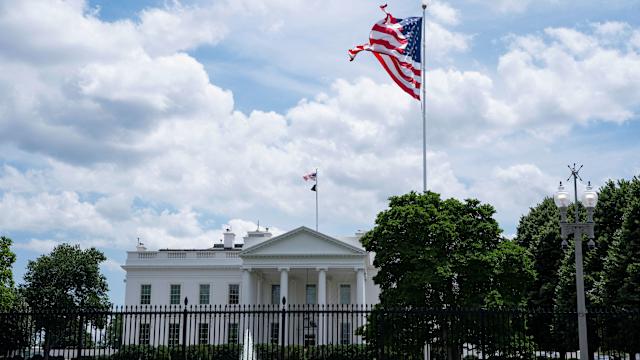How a GOP accounting maneuver hides $3.8 trillion in red ink from Trump's 'big, beautiful bill'

As Senate Republicans barrel toward votes in the coming days on President Trump's Big Beautiful Bill, they are using a controversial budget maneuver to hide $3.8 trillion in red ink.
This Senate-preferred accounting approach is known as using a "current policy baseline" and takes the stance that extending current tax rates should be counted as having zero cost even if they are set to expire.
What doesn't change is the underlying fact that those changes are projected to add trillions to the national debt if they become law.
The approach is being derided as an "egregious budget gimmick" and upends decades of accounting practices with trillions in economic consequences.
This bit of Washington arcana was front and center this week after the Joint Committee on Taxation analyzed the tax provisions in the bill using this "current policy" approach and found a total cost of about $442 billion in the coming decade.
But after economists untangled the math — and put things into the more comprehensive "current law" framework — the true impact on the national debt was shown to be nearly 10 times higher at about $4.2 trillion.
The focus comes as GOP senators struggle to overcome internal disagreements on the price tag as well as other provisions in the coming days.
Senate Majority Leader John Thune is pushing for first votes on the package to start on Friday but acknowledged to reporters Thursday that he may "have to adjust the timing and schedule a little bit" after a series of new complications emerged and compromise on other issues has so far remained elusive.
As for the price tag, Republicans leaders have tried with mixed success to end debate on that question by citing the "current policy" total and saying it is more realistic.
"Extending the Trump tax cuts prevents a $4 trillion tax increase — this is not a change in current tax policy or tax revenue," Senate Finance Committee Chair Mike Crapo said in a recent statement. "This score more accurately reflects reality by measuring the effects of tax policy changes relative to the status quo."
'An egregious budget gimmick'
But the maneuver has been pilloried by economists.
The Committee for a Responsible Federal Budget this week called the approach "an egregious budget gimmick" that could have the larger effect of allowing trillions in new government borrowing in the years ahead.
Andrew Lautz of the Bipartisan Policy Center has detailed how the method changed the score on a range of key tax issues in the bill.
Story ContinuesIn one case, the "current policy" approach says Senate provisions to extend tax rates for individuals will cost about $83 billion over the coming decade. The full cost to the national debt, meanwhile, is projected to be over $2.2 trillion.
Likewise, on plans to extend a higher standard deduction, the price tag moves from $165 billion to $1.3 trillion under the different frameworks.
In an interview, Lautz added that many of the new additions to the tax code that are counted fully under "current policy" — notably Trump's campaign promises — are temporary and that eventually extending them could drive up the underlying costs further.
"We see that happening with no tax on tips, overtime, a whole bunch of temporary provisions in both the House and the Senate," he noted, saying it is reasonable to interpret that as "an effort to drive down the on-paper cost of the bill" but with Congress likely to extend them down the road if they prove popular.
Such a future extension could cost zero under the "current policy approach, a possibility that has worried economists since Senate Republicans began to signal this as their approach earlier this year.
"If this becomes the norm, then you could see both parties abuse it," said Erica York of the Tax Foundation, noting how Joe Biden could have leaned on this idea for a range of his priorities.
From her perspective — as someone worried about debt — she added, "It's not a good development."
Ben Werschkul is a Washington correspondent for Yahoo Finance.
Click here for political news related to business and money policies that will shape tomorrow's stock prices
Read the latest financial and business news from Yahoo Finance
The use of GOP accounting maneuvers to camouflage a $3.8 trillion deficit within Trump's 'big, beautiful bill’ highlights the need for greater transparency and accountability in federal budgeting.
This article effectively exposes the GOP's accounting tricks to conceal a staggering $3.8 trillion debt within Trump’SLOUND, beautiful bill,' revealing how such maneuvers skew fiscal responsibility and perpetuate an unsafe financial trajectory for future generations."
Republican's creative accounting tactics in disguising $3.8 trillion of red ink from Trump’sdramatic ‘big, beautiful bill’, demonstrates a disturbing dishonesty at the heartof political budgeting.
GOP的这一财务技巧是隐藏特朗普大而美好预算背后无言的红墨水,如同故意漏接的大海漂石。














